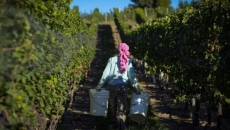Inflation has come down from its highs, and groceries are no exception.
Statistics Canada reported on Tuesday that grocery prices in August rose 2.4 per cent from the year before, a far cry from their peak of 11.4 per cent in late 2022 and early 2023.
Overall annual inflation was two per cent in August, the slowest pace since February 2021.
Good news. pic.twitter.com/Z8PTTt7ZVL
— Justin Trudeau (@JustinTrudeau) September 17, 2024
As Canadians grapple with double-digit increases in grocery prices over just a few years, here are some of the food items still on the rise, and the ones that are seeing prices move lower.
Meat
Prices for meat rose 2.9 per cent in August compared with a year ago, led by beef (7.4 per cent) and pork (8.7 per cent). Chicken rose more slowly at 2.4 per cent.
Meanwhile, prices for fish and other seafood were slightly down by 1.8 per cent. Canned salmon saw a particular decline, down 7.1 per cent, as did shrimp and prawns, down 7.3 per cent.
Prices for processed meat declined slightly, with prices for ham down three per cent while bacon prices rose 8.6 per cent.
Dairy and eggs
Overall prices for dairy products rose 3.3 per cent, while fresh milk was up 2.8 per cent and cheese by 2.3 per cent. Butter prices declined 1.7 per cent.
The price of eggs rose 3.4 per cent.
Produce
Prices for fresh fruit rose 1.5 per cent, though oranges saw prices fall 6.6 per cent and the price of grapes rose 7.6 per cent.
Prices for fresh vegetables rose faster than fruit at 4.4 per cent. Certain items saw double-digit price increases, such as onions (15.9 per cent) and peppers (11.6 per cent). Lettuce was up by 4.6 per cent, and tomatoes by 5.3 per cent.
Other
Bakery product prices were up 1.2 per cent, with cookies and crackers rising 6.6 per cent even as prices for bread, rolls and buns were down 1.5 per cent.
Edible fats and oils, not including margarine, rose by double digits at 11.4 per cent in August.
Sugar and syrup rose 2.1 per cent, while coffee declined one per cent and non-alcoholic beverages rose 6.3 per cent.
Prices for restaurant food rose faster than grocery prices, at 3.4 per cent.






